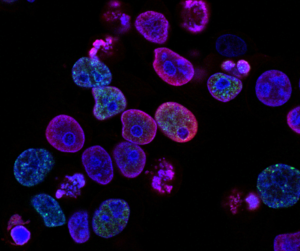Beth Sandy, MSN, CRNP
For my entire career as an oncology nurse practitioner, the gold standard for meaningful endpoints in oncology therapeutic trials has been to show a benefit in overall survival (OS). A surrogate endpoint of progression-free survival (PFS) was always nice to see in randomized settings against standard-of-care treatments, and often it would carry with it improvements in symptoms. But, in the end, we as clinicians and researchers wanted to see that the patients would be living longer in the intervention arm, sometimes despite concessions to things like safety and quality of life (QOL).
However, this concept may be shifting. A recent study in patients with multiple myeloma (MM) called DETERMINATION (ClinicalTrials.gov: NCT01208662) demonstrated that adding autologous stem cell transplant (ASCT) to lenalidomide (Revlimid, Bristol-Myers Squibb), bortezomib (Velcade, Takeda), and dexamethasone (RVD) followed by maintenance lenalidomide showed a superior PFS of 11 additional months over RVD alone. However, in an updated analysis, there was no improvement in OS. There was a modest increase in adverse events in the ASCT + RVD arm vs the RVD-alone arm, although both arms showed very similar scores for QOL using the EORTC QLQ-C30.1
A similar scenario is seen in a recent trial of KRAS G12C–positive metastatic non-small cell lung cancer (NSCLC) in CodeBreak 200 (ClinicalTrials.gov: NCT0403780). These patients were randomly assigned to receive sotorasib (Lukadras, Amgen), a targeted therapy for KRAS G12C–positive NSCLC, or standard-of-care chemotherapy with docetaxel. At 12 months, there was a doubling of the rate of PFS in the sotorasib arm at 24.8% vs 10.1% in the docetaxel arm. Again, as in the MM trial, there was no statistically significant difference in OS in either arm. There were similar safety signals in both arms of the trial; however, in the sotorasib arm, there was improved patient-reported outcomes (PROs), including time to deterioration, global health status, and physical functioning.2
The drugs/regimens in the MM and the NSCLC trials that showed improvement in PFS without an OS benefit are FDA-approved treatments, and they are considered standard of care despite lack of OS benefit.
This is a controversial subject in oncology. An article published in JAMA this year reported data showing that the FDA routinely approves cancer drugs based on PFS but then rarely withdraws them from the market when they do not show a survival benefit, even though the mandatory confirmatory trials to show OS are meant to confirm these types of results.3
A past example of this occurred with gefitinib (Iressa, AstraZeneca), the first epidermal growth factor receptor inhibitor (EGFR-I) approved for NSCLC. Back in the mid-2000s, the drug was approved based on response rates but subsequently was pulled from the market due to lack of OS in the generalized population. Fortunately, at the time it was pulled from the market, another EGFR-I, erlotinib (Tarceva, Genentech), had been recently approved, so patients had an option. However, researchers and clinicians then discovered that gefitinib, and other EGFRIs, showed benefit only in patients with EGFR mutations; thus, gefitinib was reinstated to the market for EGFR-mutation–positive NSCLC. At the time, it would have been a shame if the drug had been pulled from market without an alternative to use because we absolutely knew that some patients derived significant benefits from gefitinib.
The reality is that today cancer has become more of a chronic disease in some instances. We have so many treatments now available in second, third, fourth, and fifth lines that with crossovers in studies and multiple subsequent therapies patients are living longer. Proving a statistically significant benefit in OS may be an endpoint that is very hard to reach in many of these trials. We must take that into account in these studies that fail to extend OS but show improvements in PFS and other variables such as PROs, QOL, convenience and safety.
In summary, imagine this scenario: you have metastatic KRAS G12C–positive NSCLC. Your cancer has grown after first-line chemotherapy and immunotherapy. You have 2 options for second-line therapy. Option no. 1 is to get IV chemotherapy every 3 weeks in the infusion center with an almost 100% chance that all of your hair will fall out and a significant risk of neuropathy, fatigue, and myelosuppression requiring injections to keep up your white blood cells. Option no. 2 is to take a pill at home that will require you to come in about once a month to monitor labs and side effects that are likely to be reversible asymptomatic increased liver function tests and a 50% chance of diarrhea, most of which is low grade and controlled with anti-diarrheal medications. Both options are equal in survival. Both options can be presented to the patient for them to decide. But if we were only using OS as and endpoint for approval, option 2 would not even be a choice.

Conflict of interest disclosure: Ms. Sandy is a member of the speaker bureau for Amgen.
References
- Richardson, P. G., Jacobus, S. J., Weller, E. A., Hassoun, H., Lonial, S., Raje, N. S., Medvedova, E., McCarthy, P. L., Libby, E. N., Voorhees, P. M., Orlowski, R. Z., Anderson, L. D., Jr, Zonder, J. A., Milner, C. P., Gasparetto, C., Agha, M. E., Khan, A. M., Hurd, D. D., Gowin, K., Kamble, R. T., … DETERMINATION Investigators (2022). Triplet Therapy, Transplantation, and Maintenance until Progression in Myeloma. The New England journal of medicine, 387(2), 132–147.
- Johnson, M.L., de Langen, A.J., Waterhouse, D.M., et al. Sotorasib versus docetaxel for previously treated non-small cell lung cancer with KRAS G12C mutation: CodeBreaK 200 phase III study. ESMO Congress 2022. Abstract LBA10. Presented September 12,2022.
- Tannock, I. F., Pond, G. R., & Booth, C. M. (2022). Biased Evaluation in Cancer Drug Trials-How Use of Progression-Free Survival as the Primary End Point Can Mislead. JAMA oncology, 8(5), 679–680.







